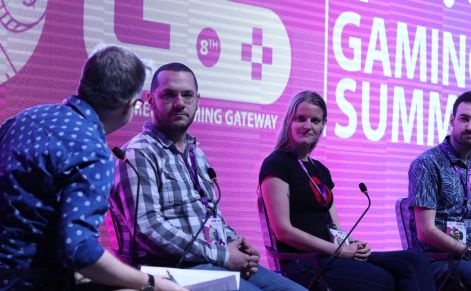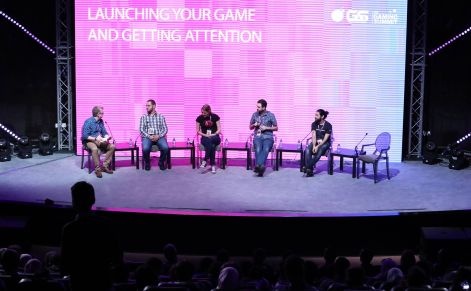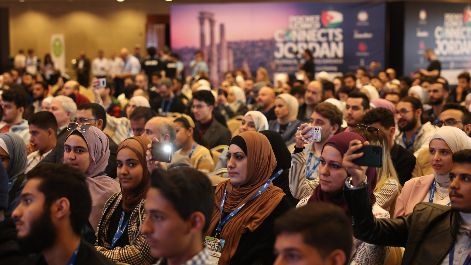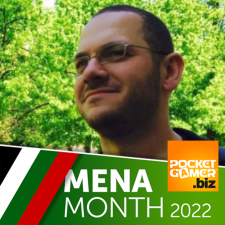Today’s insight into the Middle East market comes from Samer Abbas. He’s worked across various sectors and companies, always focused on growing the games industry in the region.
“I help international companies start their business, or grow their business, in MENA,” he explains when we speak on Zoom recently.
This is the latest in a series of interviews and profile pieces exploring the growth of the Middle East and North African games market. Samer Abbas was a speaker at both our PGC Jordan conference and PGC Leaders Summit Riyadh event this month. Abbas, who is currently working with GameFounders, discusses his own route into games, lessons for newcomers, the effects of the pandemic, opportunities and challenges for games marketing in the Middle East, publishing trends, and more...
PocketGamer.biz: What do you think is the most important lesson you’ve learned in the games industry?
Samer Abbas: If we’re talking about personal growth, I think that persistence and long-term goals are what make us or break us. Not skills. It’s having a fighting spirit and having the persistence to go through with it.
For the market, the industry: what I always like to say is that it’s a story of breaking barriers. What’s the next barrier to break? Things like Unity and the App Store contributed to democratising game development around the world. That’s why I’m a big proponent of hypercasual as an entry point for developers because I feel like it can do to commercialisation in the game business, what Unity did to 3D game development. I introduced a hypercasual track in the incubator I’m running.
Looking right now at the ecosystem, the remaining barriers are capital and know-how. If I’m a developer in the region... first of all, remove the capital barrier. Remove all the excuses related to capital. And this is happening now in Saudi Arabia.
And then next, I want to make a big game, right? I need to run a big game. There are a lot of gaps in the experience. I don’t know how to onboard players. I’m not an expert on retention. So there are a lot of gaps that we need to fill, whether it’s mentorship; whether it’s by bringing experts here; or just hiring them.

So I feel that these are the two things. And this is naturally coming from a region where you don’t have, historically, games being developed. You don’t have the cluster effect. You don’t have a Nokia. You don’t have EA. You don’t have this big pillar or anchor in the ecosystem. You’re starting from scratch.
But I think that this is something where the capital injections – the investments happening in Saudi Arabia and other countries – will resolve over time. In short, I think it’s about breaking barriers. What’s the next barrier we need to break to reach that point?
What advice would you give to a young person now who wants to get started in the games industry? Someone in your region, maybe following in your footsteps?
My advice is: get your hands dirty with game jams, with game engines. That’s the first thing.
The second thing is: what’s your long-term goal? Look at where you want to be in five to 10 years. You know where you are now. You know what you’re lacking now. If you know what you want to achieve in five years – maybe I want to lead my own company. So what goes into that? Maybe you need to start talking to people, and hiring people, and influencing people.
So maybe you need to work on your communication or your presentation skills. It’s like saying, “I’m not good at maths, but I want to graduate. So maybe I need to study more maths.” That’s one way of looking at it. This is my long-term goal, and these are my weaknesses. So either I get someone to offset my weaknesses with me on the journey, or I try to practise until I gain that skill somehow.
Maybe you need to start talking to people, hiring people, and influencing people. So work on your communication or presentation skillsSamer Abbas
And I can think of another piece of advice that's very valuable for devs starting out, which is not to hesitate to reach out to games industry folks and ask questions and ask for help. The games industry is chock full of people who love to help and will go out of their way to do so. I’ve always sent questions to folks I met in conferences (or folks I've never met!), and many of them will get back to me with answers, advice, insights, and so on. I've even reached out to employees of companies I was applying to, and they share things you don’t normally openly share– like their salary – just to help.
How did the games industry in the region cope with, and thrive after, the pandemic?
There are two things happening. First of all, speaking of it as a market, yes, there were winners in the pandemic. You had companies like Jawaker. They had the traditional card games, which people could no longer go to shisha cafes to play. Everybody was either on PUBG or Jawaker in Jordan or the Levant. That’s when they took off. And you have companies like Tamatem with Fashion Queen – everybody at home. They filled the gap with the female market.
Even in Saudi Arabia, there were local success stories. You have a game like Barra Assalfa. It’s a game by a small studio called Table Knight Games, and it went viral. It was number one in the download charts for a while. So you have the Animal Crossing-style successes that were in the region. It was just fortunate timing for them.
But also, I think that governments like UAE and Saudi Arabia, even before the pandemic, were slowly realising how important games are and how large a chunk of online communities are in games. So they were starting to support that. They were starting to think about that when the pandemic happened, and so they were fast to react. They did Games Without Borders, which was, I think, one of the biggest – if not the biggest – charity events for games. That was from Saudi Arabia. They did lots of hackathons – also to keep the youth busy, right? Because people are depressed in their homes. And you have a lot of talent.
Then coming out of the pandemic, they kept supporting game development. And so it seems the pandemic accelerated interest, and that sort of interest isn’t the kind that dies down because of people having less time. This is the government supporting games.
The government supporting games is something we did not have before. It wasn’t like in Montreal, or different game centres, where there are incentives. We had very little of that taking off before. But now we have it. We have UAE and Abu Dhabi doubling down on games. They launched AD Gaming, also, post-pandemic. They packaged all of their gaming initiatives under one brand, AD Gaming, and they’re giving incentives to big studios to start up, and allowing people to operate by introducing unique licenses for games and company registration. There are very different things that they’re doing just to enable this. And the same is happening in Saudi Arabia. So this is not slowing down.
It seems like every other week, Saudi Arabia is part of the news cycle. They’ve invested in Nintendo, Embracer, and Activision. They’re also doing the same locally. They’re building up the ecosystem locally as well. They’re talking about 300 studios. They’re talking about having 30 games in the top 100. It’s very, very ambitious numbers. 38,000 jobs! This is the national gaming strategy.
So what are the big challenges still facing games in the Middle East? Is capital the biggest problem, or are there other things needed to make the industry successful in the region?
The real challenge is having all the knowledge you need, to be part of the ecosystem. This isn’t something you can solve overnightSamer Abbas
Capital is still the challenge in the sense that, at least to the local ecosystem, you’re not seeing a lot of money going to start-ups. This is happening, but it’s just not really hashed out.
So, for example, the National Development Fund in Saudi Arabia announced a [huge fund] to support game developers. But after this announcement… what’s the mechanism to make it happen? But it’s about to be solved. I guess capital is always going to be a problem, especially if you’re a start-up, and you’re not making a business case.
The real challenge is having all of the knowledge you need, to be part of the ecosystem. Right now in Saudi Arabia, there are a lot of games industry folks from the global community. And this is great. This means that there’s a knowledge transfer happening. These people are hiring Saudis to work for them, and training Saudis to work for them. I think this is something that just needs time. This isn’t something that you can solve overnight.
You can’t solve overnight getting a Saudi studio to run a huge live service – like Overwatch or FIFA Ultimate Team or Clash Of Clans style.
Some Gulf entrepreneurs solved this problem by establishing [a studio in] the United States, or hiring teams out of Asia. But when it comes to having all of the pieces present in Saudi Arabia – it’s going to be a long time. How many game design jobs are there? How many game marketing jobs? When it comes to game design and game marketing and all of the things that are related to games management, some of it is there, but it needs time. Probably some pieces will still be outsourced outside.
I think in the last 10 years, we’ve proven that we can make games for the region. But you do it by copying something that’s working outside. But to succeed globally, you can’t do that. You need to do something unique. You need to do something to stand out to be able to compete with the big names and have success. I think we need to prove ourselves on the global stage.
If I said “an Arabic game” now – what does that mean? What are you going to imagine? Are you going to imagine Prince of Persia, or are you going to imagine a game from the Arab world?!
When I say “Japanese game”, you conjure an image of a Japanese game. If I say “British game” – for me, British games used to represent originality. You know, the stuff that Rare or Psygnosis did. So I always associated different gameplay and originality with British games. And America was where they did the sports and fighting games when I was young. If I say “Polish game”, you immediately think of Witcher and CD Projekt Red, or you might think of the horror games by Blooper Team.
So what does an Arabic game look like? I’m interested to find out the answer to that. I mean, we still don’t know. We have rumblings. We have people like Sandsoft investing millions, we have the Savvy Game Group, and we have MBC Group, the media and broadcasting giant, partnering with NEOM to establish a triple-A game studio. So maybe in five to seven years, we will have an answer to this question.
One other thing missing is game education; I don’t see enough being done to build out game dev degrees yet.
A video of Samer Abbas discussing games and education in 2018.
What are the big opportunities in the region? A young demographic works in its favour. Are there other things helping the games industry?
I guess age plays a part, because you just have more time to play games, right?
As a market, it’s fragmented. I have this struggle with companies I work with that are European – you don’t have MENA as a single business region. Maybe you’re sorting your analytics by country. Saudi Arabia is never going to be near the top because you have countries like the China, US, Russia, Brazil: countries with huge populations.
But if you looked at the region as a whole, then it’s probably going to rank somewhere in the top 10, depending on your game! If you look at the top grossing countries for a game like PUBG Mobile, MENA (or Saudi Arabia plus the UAE) are in the top five, right after the US and India.
A good thing about the region is that it’s accessible... There’s no financial regulation or any sort of limitations that prevent global companies from coming inSamer Abbas
But it’s hard to generalise about the whole region. For example, there are certain territories or certain countries where people are very competitive, like Egypt, and Jordan. And you have places like Saudi Arabia, which has high-paying users, so there’s a concentration of whales.
To talk about “the MENA region” is to overlook that Saudi Arabia and Jordan and Qatar and Abu Dhabi and Lebanon and Egypt are completely different territories. They have their own national cultures and different dialects as well. Do you think that people from Europe or America think enough about how each country in the Middle East needs to be localised differently?
Absolutely. I think sometimes you’re a games company, and you want to make an ad campaign for Saudi Arabia, so you go to a company you know in Dubai, and ask them to make a video for you. You’re targeting Saudi Arabia… with an Emarati dialect. It’s not a good look, you know?
The Gulf region, which is affluent, has more disposable income – and that’s actually 55 million people. So that gives it a bit more legs. If we treat it country by country, then we’re automatically putting countries like Bahrain and Qatar at a disadvantage. Nobody wants to localise a game for a million people, right? They’re going to localise the game for 120 million people, like in Turkey or Japan. But they’re not going to localise the game for a million people. If you look at the region as a whole, it helps the perspective.
If you think about the region in terms of subregions, you have an interesting market… I don’t want to speak in stereotypes, but in North Africa, you can treat Egypt as one subregion because it’s one-quarter of the population – it’s 100 million, and they have their own dialect, and they have their own culture. Then you have the Maghreb region in North Africa. They’re French-speaking. You can treat it, also, as one subregion. North Africa, as a whole, is a volume market. It’s not a market where you monetise.
When I talk to clients, I always tell them to look at the map, and I tell them that it’s different. If you’re looking at LTV, you need to look at these countries. If you’re looking for a volume of players, then another subregion is where you need to look. Or maybe engagement – not necessarily revenues and LTV.
One good thing about the region is that it’s accessible just by the press of a button and localising to Arabic. There are no financial regulations or any sort of limitations preventing global companies from coming in.
What big trends in games in the last year have you observed across the globe? Have worldwide gaming trends had an impact on the MENA industry?
Business models are usually interesting to me. I’m really interested in how subscriptions are going to play out, and what they’re going to mean for developers, and also for consumers.
I’m at an age where I’m a comfort gamer. I have less time to play games, so I go to familiar. It’s like when we say comfort food, and we say comfort TV. So we go to Star Trek or Columbo. And for me, I’m a Zelda and Mario gamer.
If we distil it to what web3 is about, it’s not so objectionable. What’s objectionable right now might be the execution. It might be the bad actorsSamer Abbas
So I think subscriptions will allow me to play all the games I want. You know how Microsoft sometimes introduces all the Fallout games or all the games in the series, and you can play all you want of these games? I think it’s going to help in that sense. It’s going to be great for certain segments.
Maybe there’ll be a revival of episodic games. You know how we have these seasonal games, the service games, and in terms of content, maybe episodic will start to make sense again. I wouldn’t say I’m predicting – but it’s more like: why isn’t this happening?!
There’s still some scepticism around web3, the metaverse… NFTs even more so. What is the direction of travel with these topics?
I’m watching web3, the metaverse. And I’m waiting for the dust to settle. I tend to avoid things that I don’t understand. I understand the concept behind them. But for me, there’s too much noise. There are credibility issues. Whenever you have people just going en masse in one direction, and then you’ve got a lot of scams happening. This is after how Facebook popularised the idea of the metaverse. I was in Lockwood back then. So the metaverse was part of our everyday conversation.
If we distil it to what web3 is about, it’s not so objectionable, right? What’s objectionable right now might be the execution. It might be the bad actors that are in these areas – people selling land to people who should know better.
But I think if you distil it down to what it is – basically the new internet where you will be embodied. It’s a sound idea. It’s exciting. And NFTs – the idea of scarcity, digital rarity, or digital collectables. There’s nothing wrong with the idea itself. I think it’s interesting.
But then: the execution, where the first thing you hear when you pitch an idea is that people talk about the details and the challenge. They don’t pause and think, “Oh, yeah, this is a good idea. This will happen eventually.” They just squabble and then polarise.
I’m not part of either camp. I just have fun on Twitter, taking jabs at either party. But I’m not in either camp. I’m just waiting for the dust to settle.
When you have a new market, you always have this window of time at the beginning where the first people – the early adopters – are going to be either the biggest players or they’re going to burn a lot of money. There are a lot of losers. I guess this is what they call a bubble. And then there are winners who emerge that are going to be huge because they were there at the beginning.
It’s going to be really hard for new entrants to come in, like how mobile now is dominated by the same companiesSamer Abbas
But when the market matures, at the end of the S-curve, it’s going to be really hard for new entrants to come in. It’s kind of like how mobile now is dominated by the same companies at the top of the charts. There are people who come in. There are new faces and new names that come in, of course. But [mobile is] less fluid now than maybe how it was before.
We’re back to live conferences again. Is it a relief to be back to live events?
I haven’t had the opportunity to go to many big live events yet. I’ve been in smaller community events like the IGDA chapter in Riyadh, which is 70 to 100 people. It’s a small, intimate community event.
I used to feel left out when it was six months without going to any game event! So I’m really looking forward to going back. Pocket Gamer Connects Jordan was my first big event since the pandemic.
Can you describe your background, and how you came to be in the games industry?
I was interested in being a game designer and started asking questions about how games were made when I was 13 years old and playing Super Mario. A lot of people relate to this: when you’re player two, and you’re not the good one, and your turn ends in a few seconds. I got interested in games from a game design perspective, because I was seeing this joyous experience, and I started to go, “How did they create that? How did they do that?”

During my university years, games weren’t viewed in the region as something that puts food on the table. You didn’t have things like smartphones. You didn’t have things like self-publishing. You didn’t have things like Unity. So people were saying, “No way is Metal Gear or Final Fantasy or FIFA going to come out of this region. There’s no way that’s going to happen.” My parents were happy with us playing games because it meant we were off the streets. But they never really hid the fact that they think we’re wasting our time!
There wasn’t anybody to talk to about these things, so I would go to forums, and try to find online communities to just have an outlet to talk about my passion for game design. I tried to learn game programming, but but that didn’t work out for me.
And then I got my calling. The King of Jordan visited the US, trying to court some of the big companies like Electronic Arts to come and invest in the region. The Ministry of Information and Technology and Communications called me and said, “Someone told us that you like games. You talk a lot about games. Can you come so we can interview you?" They started asking me questions about the market. You know, how many PlayStations are there? How much revenue?
I didn’t have the answers. But that was the moment of my calling. “Maybe to get into games. I shouldn’t worry about making games now. Maybe I should get into market research, get some data out there, and then people will use that, and investments will follow. ”
I realised that we need to get the community together. We need to understand what the talents areSamer Abbas
I joined a market research company in Jordan and after a while of focusing on telecom, media and technology markets, I pitch doing games reports. The timing was perfect. 2007 and 2008 and 2009 – that was when free-to-play browser games took off. Games like Travian. They mass-translated on Google Translate into 50 languages. And so you ended up having a very good game being the top result when you search for games in Arabic. That basically opened up investments into games. And we started getting client requests. I also ended up doing the first report about the online games market in the region.
What happened next?
That was my entry into games. Then I wanted to go deeper into the industry; I quit my market research job and tried to make games again, but still couldn’t find collaborators easily. So that was my second calling; I realised that we need to get the community together. We need to understand what the talents are. That was when I joined the game portal, which was trying to be Kongregate for the Arabic language. We did the annual Game Zanga game jam and formed a community around our game portal. The game portal business died, but the game jam continued with Danar Kayfi from Iraq picking up the reins.
After GameTako and Game Zanga, I was thinking about: what should I do next? I started off with market research, and then I went into the game development community. And each one of them felt strategic to me, and each one of them allowed me to talk to a lot of people.
I wanted to get closer to the product side. So a game publisher was a natural way for me just to get closer to launching games and get closer to the product. Joseph and Ahmed [of Play 3arabi], back then, had just left Peak Games. I was having conversations with them. I was doing some intros for them. And then they were like, “Hey, why don’t you join us?” And that’s how Play 3arabi happened.
In Play 3arabi, I ended up being this marketing generalist guy, so to speak, handling everything from distribution, store relations to user acquisition and influencer marketing. That ended up being strategic for me as well, enabling me to transfer that knowledge to regional developers and to help global businesses enter and grow their businesses in the region. Back when we started Play 3arabi I was one of a few game marketers in the region solving for experience in that field.
After leaving Play 3arabi, I spent a few years working remotely as a contractor helping global companies grow in the region. Most recently, I joined GameFounders as their program manager running an incubation and acceleration program in Saudi Arabia.
Looking back at my experiences, the thing that I felt had the most impact was my game developer support and relations work. I was the early organiser and co-creator of Game Zanga. So for me, seeing the impact that it had on developers, made this really my passion. I’m always asking myself: how can we elevate game developers in the region? And now with GameFounders, I have the opportunity to play a bigger role in building the regional ecosystem and to answer this question.

We’re grateful to Samer Abbas and our other speakers for contributing to our analysis of the Middle East region. We have published more interviews, both video and written, over the last month. If you found this article useful, you can hear more from Samer Abbas in this 2020 PGC Digital panel. Remember to bookmark our MENA content and read the report about the triumphant return of the Pocket Gamer Connects Jordan experience.





















